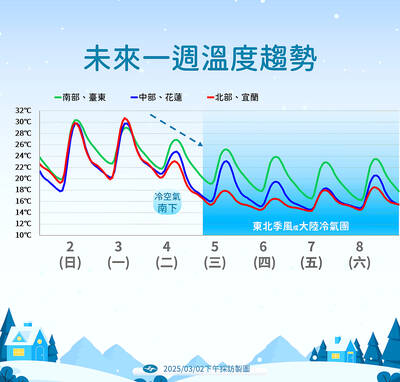AP, TOKYO
China's anti-satellite weapons test raised concerns in Asia and the US yesterday about the rising militarization of space and prompted governments to demand explanations from Beijing.
The US said China conducted the test earlier this month in which an old Chinese weather satellite was destroyed by a missile.
Analysts said China's weather satellites would travel at about the same altitude as US spy satellites, so the test represented an indirect threat to US defense systems.
Officials in Japan and Australia immediately demanded China explain its actions.
Australian Foreign Minister Alexander Downer, who was in New York, said Sydney opposed the test and had called upon Beijing's ambassador to Australia, Madame Fu Ying, for an explanation.
"Our concern about this is that to have a capacity to shoot down satellites in outer space is not consistent with ... the traditional Chinese position of opposition to the militarization of outer space," he told reporters.
"So we've asked the Chinese for an explanation as to what this may mean," Downer said, adding that so far Chinese officials, including the ambassador in Canberra, said they are not aware of the incident.
The US Department of Defense would not comment on the test, but other US officials said it raised serious concerns in Washington.
"The US believes China's development and testing of such weapons is inconsistent with the spirit of cooperation that both countries aspire to in the civil space area," National Security Council spokesman Gordon Johndroe said Thursday. "We and other countries have expressed our concern to the Chinese."
Japanese Prime Minister Shinzo Abe said Tokyo has asked Beijing for an explanation and stressed the importance of the peaceful use of space.
"We must use space peacefully," he said. "We are asking the Chinese government about the test."
Japanese Foreign Minister Taro Aso criticized Beijing for failing to give advance notice to Tokyo.
"We told China that we doubt if we could call this a peaceful use," Aso said at a press conference.
Yasuhisa Shiozaki, Japan's top government spokesman, suggested that China's lack of transparency over its military development could trigger suspicions about its motives in the region.
Meanwhile, China said yesterday that other nations had no reason to feel threatened by its space program amid reports that it had shot down a satellite for the first time.
"There's no need to feel threatened about this," Foreign Ministry spokesman Liu Jianchao told journalists, but he declined to confirm that China had downed one of its own satellites.
"So far we have not got any confirmed information about this."
He added that China had no intention of triggering an arms race in space.
also see story:
Editorial: China's missile tests the US

SECURITY: The purpose for giving Hong Kong and Macau residents more lenient paths to permanent residency no longer applies due to China’s policies, a source said The government is considering removing an optional path to citizenship for residents from Hong Kong and Macau, and lengthening the terms for permanent residence eligibility, a source said yesterday. In a bid to prevent the Chinese Communist Party (CCP) from infiltrating Taiwan through immigration from Hong Kong and Macau, the government could amend immigration laws for residents of the territories who currently receive preferential treatment, an official familiar with the matter speaking on condition of anonymity said. The move was part of “national security-related legislative reform,” they added. Under the amendments, arrivals from the Chinese territories would have to reside in Taiwan for

CRITICAL MOVE: TSMC’s plan to invest another US$100 billion in US chipmaking would boost Taiwan’s competitive edge in the global market, the premier said The government would ensure that the most advanced chipmaking technology stays in Taiwan while assisting Taiwan Semiconductor Manufacturing Co (TSMC, 台積電) in investing overseas, the Presidential Office said yesterday. The statement follows a joint announcement by the world’s largest contract chipmaker and US President Donald Trump on Monday that TSMC would invest an additional US$100 billion over the next four years to expand its semiconductor manufacturing operations in the US, which would include construction of three new chip fabrication plants, two advanced packaging facilities, and a research and development center. The government knew about the deal in advance and would assist, Presidential

‘DANGEROUS GAME’: Legislative Yuan budget cuts have already become a point of discussion for Democrats and Republicans in Washington, Elbridge Colby said Taiwan’s fall to China “would be a disaster for American interests” and Taipei must raise defense spending to deter Beijing, US President Donald Trump’s pick to lead Pentagon policy, Elbridge Colby, said on Tuesday during his US Senate confirmation hearing. The nominee for US undersecretary of defense for policy told the Armed Services Committee that Washington needs to motivate Taiwan to avoid a conflict with China and that he is “profoundly disturbed” about its perceived reluctance to raise defense spending closer to 10 percent of GDP. Colby, a China hawk who also served in the Pentagon in Trump’s first team,

The arrival of a cold front tomorrow could plunge temperatures into the mid-teens, the Central Weather Administration (CWA) said. Temperatures yesterday rose to 28°C to 30°C in northern and eastern Taiwan, and 32°C to 33°C in central and southern Taiwan, CWA data showed. Similar but mostly cloudy weather is expected today, the CWA said. However, the arrival of a cold air mass tomorrow would cause a rapid drop in temperatures to 15°C cooler than the previous day’s highs. The cold front, which is expected to last through the weekend, would bring steady rainfall tomorrow, along with multiple waves of showers